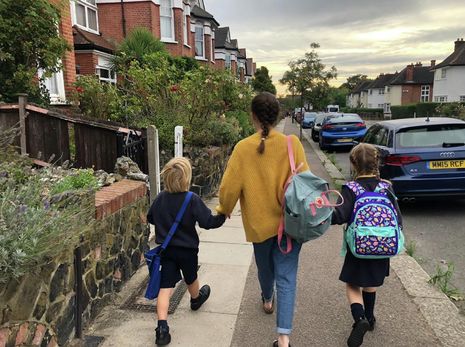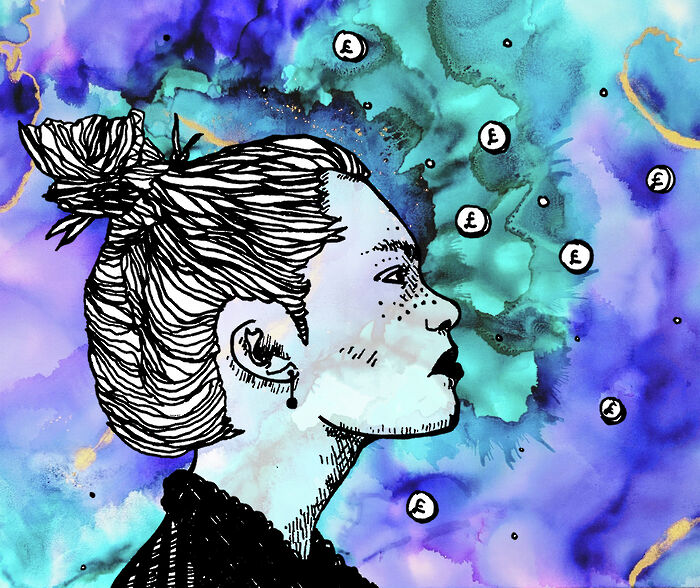From au pair to self care
Lily Kemp reflects on her job as an au-pair this time last year, sharing how she has discovered the importance of reconnecting with her inner child

This time last year I was balancing a cup of tea in my right hand with a grumpy toddler on my lap, desperately flicking through Judith Kerr’s The Tiger Who Came to Tea for the fourth time that day. Such were the typical mornings of my new life as an Au Pair in London. And nothing could’ve prepared me for the change.
During my first week, I attended a forest school playgroup session with my toddler. Essentially, parents pay for their children to walk around nature with miniature wheelbarrows for an hour, singing songs whilst sitting on damp logs. The nursery rhymes still float around my brain cells to haunt me when I’m overwhelmed. I thought I’d fallen through the looking glass because everyone seemed to speak on 0.5 speed. By the end of the second week, I had hit rock bottom on a night of babysitting; after having to read three sets of bedtime stories, tidy three sets of toys away and finally putting three children to bed, the youngest had woken up screaming two hours later. It was in this moment I began to ask myself, ‘If I was also a child once with these very same needs, why is this so hard?’.
“I had lost my inner child. Everyone’s most original, authentic self, formed in childhood and often side-lined by the adult world”
When my Au Pairents arrived home, I cried and admitted defeat, explaining how overwhelmed I felt. To which my wise Au Pair Mum said, ‘Teenagers have the exact same needs as toddlers.’ At the time, this annoyed me. How could my feelings be diminished to the same pure rage and irrationality of a tiny child’s? But then, she elaborated. ’As humans, we all need sleep, food, comfort and our own space. This never changes.’
Indeed, I was deprived of these basic things while looking after the children that day, but I also didn’t have a regular schedule before becoming an Au Pair. This lack of schedule was certainly not uncommon to the many others within my ‘Class of Covid’ cohort. So was my disillusionment understandable?
How could I find a sense of childhood calm, when the education system I had been a part of for all my life made me abandon my work-life balance? Children in the UK education system are constantly tested, pressed, and prodded, starting with year two SATS and ending with the grand old A-Level (or IB). When 2020 A-Level exams were cancelled for the first time since their introduction, I still felt I couldn’t step off the conveyor belt. Those cancellations made me feel an enormous sense of relief but I also wondered who I was without this milestone.
I was lost. Or rather, I had lost my inner child. Everyone’s most original, authentic self, formed in childhood and often side-lined by the adult world. The most integral part of anyone’s personality because it stems from where we find joy, peace, and safety.
“Just because we get older, doesn’t mean we don’t still need fundamentals of what once made us happy”
Engaging with the inner child isn't only for those who have experienced childhood trauma. I had an amazing childhood, but I lost my sense of joy and peace along the path of exams, destroying my food and sleep patterns. There is a reason children have bedtimes, and breakfast and wind down time; it is to find inner calmness and clarity.
Seeking advice from my loved ones on how to rediscover my inner child, my best friend told me that when she felt lost, she did what made her happy when she was eleven: reading Harry Potter and drawing pictures. I realised that perhaps this is what gap years are supposed to be about. When people use them to soul search in India or going out on the lash with new friends, I wonder if it's actually about reconnecting with the lost hobbies and interests you already have, but never have had time for.
I started out doing ballet. As a child, I danced weekly and was never very good, but I enjoyed it immensely. Deciding this was a lost childhood passion, I took up weekly classes as a beginner at my local ballet studio in South London. Although I knew I would never be a dancer, or be the ‘best’, or even fit in with the whole ‘retiree’ vibe of the class, I enjoyed it with every fibre of my being, because it felt authentic and joyous to just try my best.
Sleep was next on the agenda: I aimed to get eight-ten hours every night. Now, as a student, this seems purely optimistic and almost mythical, but I did this every day for months last year. The effects: my diary transformed from frenetic and broken thoughts to a much more relaxed and kinder space.
But a year on, have I ‘healed’ my inner child? Have I listened to her? Mine certainly wasn’t wounded, just neglected, and doing things that made me feel happy made her feel listened to. Nurturing our inner child is a lifelong process. As I’ve been writing this, my 80-year-old Grandad sent me a picture of a house in the woods captioned it ‘fairy land’; he is clearly still looking out for the child within him.
While you have now made it through week five, please be mindful of the inner child and respect your own boundaries with work and relaxation. Part of adult-ing is managing to keep grounded amidst incoming waves of stress. Stress is more manageable when you look after your basic needs. It’s a fact.
Although this year I’m no longer schlepping through vast quantities of picture books every morning (although sometimes I wish I was), I need to remind myself to routinely look after my inner child. We are all children at heart — just because we get older, doesn’t mean we don’t still need fundamentals of what once made us happy.
 News / CUP announces funding scheme for under-represented academics19 December 2025
News / CUP announces funding scheme for under-represented academics19 December 2025 News / Cambridge welcomes UK rejoining the Erasmus scheme20 December 2025
News / Cambridge welcomes UK rejoining the Erasmus scheme20 December 2025 Comment / Yes, I’m brown – but I have more important things to say22 December 2025
Comment / Yes, I’m brown – but I have more important things to say22 December 2025 News / SU reluctantly registers controversial women’s soc18 December 2025
News / SU reluctantly registers controversial women’s soc18 December 2025 Film & TV / Timothée Chalamet and the era-fication of film marketing21 December 2025
Film & TV / Timothée Chalamet and the era-fication of film marketing21 December 2025









